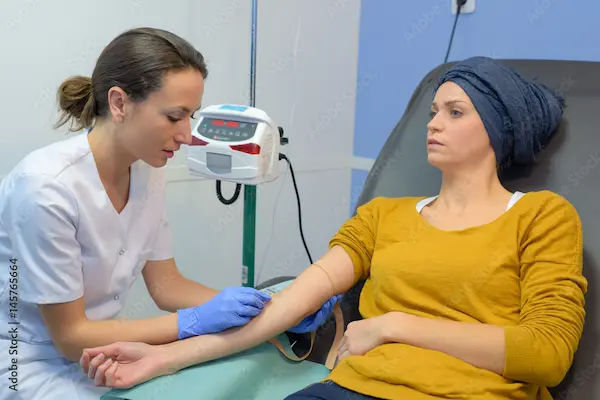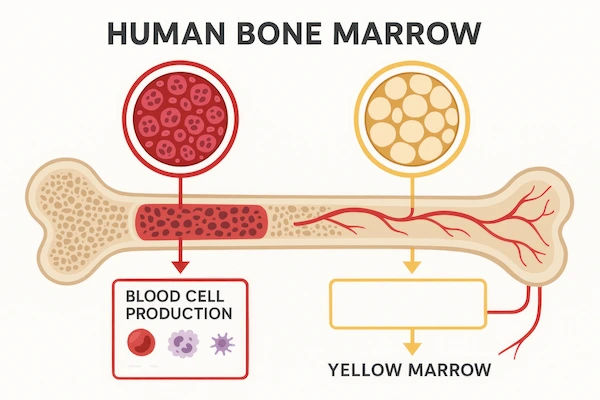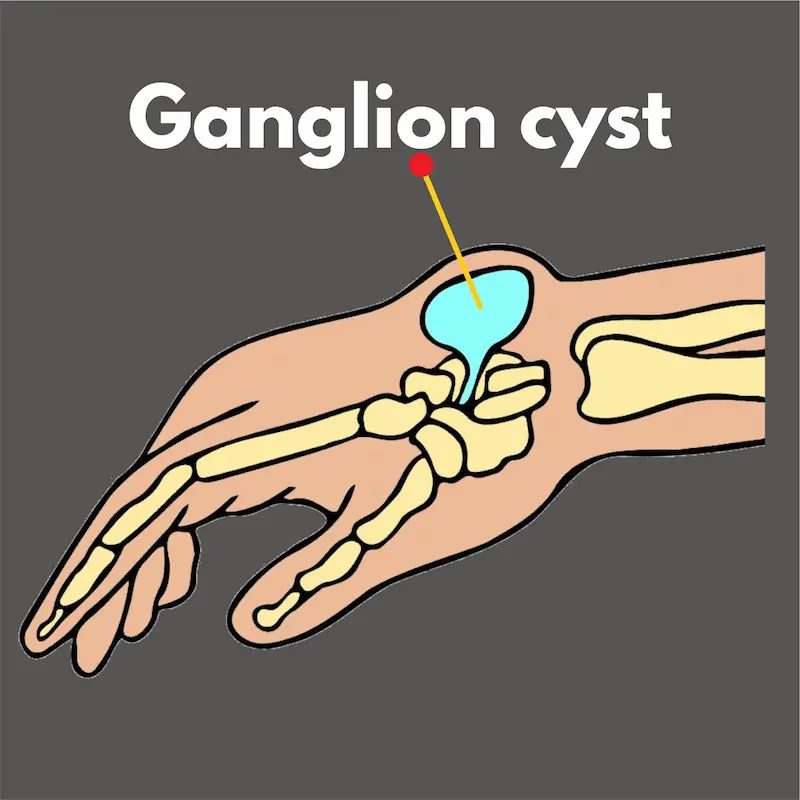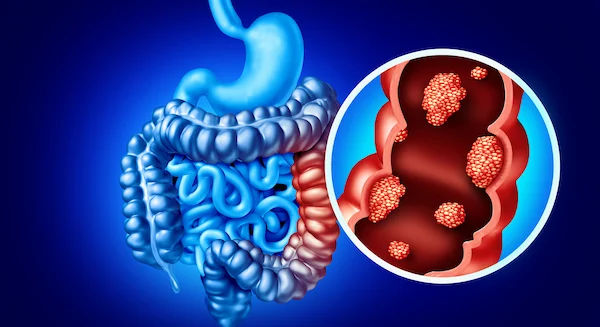Companion Diagnostics in Breast Cancer Treatment
Discover how companion diagnostics in breast cancer help doctors personalise treatments, improve outcomes, and reduce side effects through targeted testing.

.webp?tr=q-80,f-webp,w-350,dpr-2,c-at_max 700w)
Breast cancer is a challenging journey, but modern medicine has made significant progress in diagnosing and treating it effectively. One such advancement is companion diagnostics, a powerful tool that helps doctors personalise treatment plans for better outcomes. If you or a loved one is dealing with breast cancer, understanding companion diagnostics can help you make informed decisions about your care.
What Are Companion Diagnostics?
Companion diagnostics are specialised tests that help doctors determine whether a particular treatment will work for a patient. These tests analyse specific genes, proteins, or other biomarkers in a tumour to predict how a patient might respond to certain therapies.
In breast cancer, companion diagnostics play a crucial role in identifying the best treatment options, reducing unnecessary side effects, and improving survival rates.
Why Are Companion Diagnostics Important in Breast Cancer?
Not all breast cancers are the same. Some grow due to hormone receptors (like estrogen or progesterone), while others are influenced by the HER2 protein or genetic mutations. Companion diagnostics help doctors classify breast cancer into subtypes, such as:
- Hormone receptor-positive (ER/PR+)
- HER2-positive (HER2+)
- Triple-negative breast cancer (TNBC)
By identifying the exact type, doctors can choose targeted therapies (like hormone therapy or HER2-targeted drugs) instead of relying on a one-size-fits-all approach.
Common Companion Diagnostic Tests for Breast Cancer
Here are some key tests used in breast cancer treatment:
1. HER2 Testing
- Purpose: Checks if the cancer cells have too much HER2 protein, which makes the tumour grow faster.
- Why it matters: If HER2 is positive, drugs like trastuzumab (Herceptin) or pertuzumab (Perjeta) can be highly effective.
2. Hormone Receptor Testing (ER/PR)
- Purpose: Determines if the cancer is fueled by estrogen or progesterone.
- Why it matters: If positive, hormone-blocking therapies (like tamoxifen or aromatase inhibitors) can slow or stop cancer growth.
3. BRCA Gene Testing
- Purpose: Checks for inherited mutations in the BRCA1 or BRCA2 genes.
- Why it matters: Patients with these mutations may benefit from PARP inhibitors (like olaparib) or preventive measures for future cancers.
4. PD-L1 Testing (For Triple-Negative Breast Cancer)
- Purpose: Measures PD-L1 protein levels to see if immunotherapy (like pembrolizumab) could help.
- Why it matters: Immunotherapy can boost the immune system to fight cancer cells.
Get Your Symptoms Checked now
How Are These Tests Done?
Most companion diagnostic tests require a small tissue sample (biopsy) from the tumour. The sample is sent to a lab where experts analyse it for specific biomarkers. Some tests may also use blood samples (liquid biopsy).
Benefits of Companion Diagnostics
- Personalised Treatment: Avoids unnecessary treatments that may not work.
- Better Outcomes: Increases the chances of successful therapy.
- Reduced Side Effects Minimise exposure to ineffective drugs.
- Early Detection of Resistance: Helps doctors adjust treatment if the cancer stops responding.
What Can You Do as a Patient?
- Ask Your Doctor: If companion diagnostics have been recommended for your case.
- Understand Your Report: Discuss what your test results mean for your treatment plan.
- Stay Informed: New tests and treatments are constantly evolving—keep up with advancements.
- Follow-Up Testing: Some cancers change over time; retesting may be needed.
Lifestyle and Support Tips
While companion diagnostics guide medical treatment, lifestyle changes can also support recovery:
- Healthy Diet: Focus on whole foods, lean proteins, and antioxidants.
- Regular Exercise: Helps reduce fatigue and improve mood.
- Stress Management: Practices like meditation or yoga can help.
- Support Groups: Connecting with others facing similar challenges can be comforting.
When to Seek Help?
If you’ve been diagnosed with breast cancer, talk to your oncologist about whether companion diagnostics could help tailor your treatment. Early and precise testing can make a significant difference in your journey.
Need a Consultation or Test?
If you or a loved one needs guidance on breast cancer diagnostics, Apollo 24|7 offers expert consultations and advanced testing options. You can book a consultation or schedule a test easily through the Apollo 24|7 app or website.
Final Thoughts
Companion diagnostics are transforming breast cancer care by ensuring that patients receive the most effective treatments with fewer side effects. If you’re navigating this journey, remember—knowledge is power. Stay informed, ask questions, and work closely with your healthcare team to make the best decisions for your health.
Consult Top Oncologist
Consult Top Oncologist

Dr. Rupam Manna
Radiation Specialist Oncologist
7 Years • MBBS MD(RADIO THERAPY), CCEBDM
Barasat
Diab-Eat-Ease, Barasat

Dr. Sanchayan Mandal
Medical Oncologist
17 Years • MBBS, DrNB( MEDICAL ONCOLOGY), DNB (RADIOTHERAPY),ECMO. PDCR. ASCO
Kolkata
MCR SUPER SPECIALITY POLY CLINIC & PATHOLOGY, Kolkata

Dr. Prathyush V
Medical Oncologist
8 Years • MBBS Oncology MD Radiation DNB
Bengaluru
Apollo One Electronic City, Bengaluru

Dr. Harsh J Shah
Surgical Oncologist
15 Years • MS, MCh (GI), DrNB (GI)
Ahmedabad
Apollo Hospitals Gandhinagar, Ahmedabad

Dr. Gopal Kumar
Head, Neck and Thyroid Cancer Surgeon
15 Years • MBBS, MS , FARHNS ( Seoul, South Korea ), FGOLF ( MSKCC, New York )
Delhi
Apollo Hospitals Indraprastha, Delhi
(25+ Patients)






